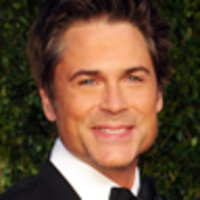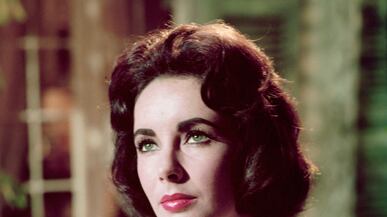In the summer of 1986, my brother Chad was playing Elizabeth Taylor’s son in a TV movie called There Must Be a Pony. One day, I came by for a visit. Although not in her true hey-day, Elizabeth Taylor was still melting down anyone in her vicinity with her isotope-like charisma. No one was immune to her charm beam, not even the show’s producer who had just been told to return his production present to Elizabeth, a state-of-the-art Winnebago. “Elizabeth would prefer a different color. Perhaps lavender,” offered her assistant.

The queen is dead, long live the queen. Elizabeth Taylor’s passing is the true death of Hollywood royalty. And unlike real-world monarchies, the kingdom of Hollywood will not have a smooth transition to a new heir. Because there isn’t one. Because there cannot be one. Because in a company town like ours, the factory discounted the line, bit by bit every year. We truly aren’t making `em like we used to.
Elizabeth Taylor was not only one of the most beautiful people who ever lived and the epitome of “the world’s biggest movie star,” she was a survivor, a gamer, a brave and groundbreaking activist, tabloid-fodder pioneer, branding entrepreneur, and world-class connoisseur of interesting men. She was an actress of both softness and power; her arresting glamour hid a reservoir of passion and, if needed, viciousness. In Who's Afraid of Virginia Woolf, never before had someone like her been so riveting and breathtakingly ugly. In A Place in the Sun, you didn’t need to be as troubled as Monty Clift to want to smash an oar over someone’s head to be on the receiving end of that iconic screen kiss. Elizabeth Taylor could be bawdy and blowsy, a two-fisted brawling broad, and an enigmatic, radiant façade with the serene dignity of Cleopatra. She had every club in the bag and in the course of her career, she was pretty much able to hit `em all and had two Academy Awards to prove it.
Her influence was far-reaching. I once appeared in a production of The Three Sisters at the Williamstown Theater Festival with Christopher Walken. I was young and paying attention to all I could. One day I watched as Chris applied his make-up for a matinee; heavy black eye liner and a dash of blue eye shadow.
“That’s serious eye make-up,” I remarked.
“You bet!” says Chris, finishing up. “I want to look like Elizabeth Taylor.”
She knew how to carry herself. She understood that there was a place (and a need) for both the common touch and benevolent untouchability. In today’s era, where actor’s drop f-bombs from award podiums or slather the audience in aggressive gratitude, drowning you in a syrup of false humility, it’s impossible to imagine Taylor doing the same, then driving off in a Prius. She knew there was no point in pretending to be just like everyone else when the whole world already knows you are not. She understood that people need fantasy and magic in their lives. She didn’t deflect that kind of projection, she owned it and so she owned herself. So when AIDS first appeared, when actors were afraid to kiss one another lest they catch it, when our president wouldn’t even mention the word lest he be even remotely associated with it, there was Elizabeth Taylor, more famous than the president ever thought about being, saying, “Open your heart. Pay attention.”
She had every club in the bag and in the course of her career, she was pretty much able to hit `em all and had two Academy Awards to prove it.
She was the first in other areas as well, in commercial endeavors where Oscar winners previously dared not tread. How things have changed. Today, you almost need a perfume ad to get you cast in a role that might get you an Oscar!
During my visit to the set so many years ago, I was able to witness the master using her very special bag of tricks. In her lifetime, she navigated both schools of film acting; the formal, presentational, charm-school of the studio system and the raw, naturalistic, “honest” movement of The Method. But on this day, as usual, Taylor played it her way.
The scene called for her to receive the tragic news that her lover had been killed in a plane crash. As a young actor, I was interested in how her own real-life experience with the loss of a husband in an air tragedy might manifest itself in how she played the scene. I stand in the shadows as she begins rehearsal.
“I’d like to be chopping up a salad when I hear the news,” Elizabeth tells the director. Cutlery and vegetables are brought in. Soon everyone is ready for the first take and the cameras roll. My future Austin Powers co-star, Robert Wagner enters and gives Elizabeth the tragic news. Her face registers shock and for an instant, she freezes. Then, slowly, she reaches down to a chopping block and a large linen napkin. She covers her face with it, inhales deeply and trembles, as the tension builds. When she lowers it, rivulets of tears stream from her famous lavender eyes. She buckles to the floor and the scene is over. The entire sound stage is riveted. Chad takes me onto the set for introductions.
“Hello, Rob. It is so nice to meet you,” she says graciously, not minding for a minute that I’ve intruded after such a heavy moment.
“You were amazing just now,” I say.
Her eyes twinkle. “Oh, please,” she says rolling them.
“No, really!” I say. “You went to such an extraordinary emotional place.”
She smiles at me and reaches for the napkin she had just used in the scene.
“Try this next time you need it,” she says with a wink.
I feel something hidden in the napkin and open it. Tucked away inside is a giant half of a cut, raw onion.
Elizabeth Taylor. An icon without bullshit. A trailblazer without fear. Doing whatever she needed to get the job done and taking our breath away while she did it.






